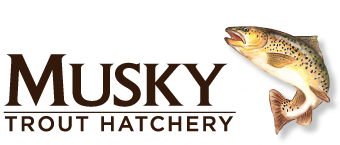FAQs
Will fish stocked in my pond survive?
Many things can affect stocking fish into a pond, but the most important is oxygen availability. It is important to have some idea of the potential availability of oxygen (good, okay, or bad!) in your pond. Only the lowest oxygen levels during the year, or worst case, matter. Even if the oxygen available to your fish is too low for only a matter of minutes throughout the year, the fish will die. (They need to breathe too!) August frequently provides a good indication of how well a pond will hold fish. There are generally 3 primary sources of oxygen in a pond: photosynthesis of plants, absorption from the air, and water flowing into and through the pond. In small ponds, the type found on most properties (less than an acre and fairly shallow), the ponds' water supply is the most reliable source of oxygen through the year. If you have a pond that does not discharge water in August, and starts getting shallower, it is also probably low in oxygen and risky to stock with fish. A aeration system will help keep your fish alive when the oxygen is low.
